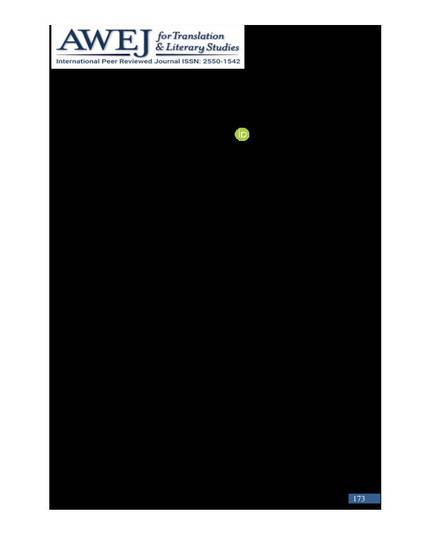
Article
Unmasking the Psyche of Shakespeare’s Richard III and Lady Macbeth through Freud’s “The Uncanny”
AWEJ for Translation & Literary Studies
(2024)
Abstract
Richard III and Lady Macbeth are often portrayed as complex and paradoxical Shakespearean characters, reflecting the human psyche’s complexity. This paper examines two Shakespearean characters, Richard III and Lady Macbeth, within a psychoanalytical framework centered around Freud’s concept of the uncanny. It addresses research questions about the interaction between cunning schemes and complex dynamics shaping characters’ psyches, such as how the idea of the uncanny aids in comprehending the similar roles that both Lady Macbeth and Richard III play in each play. How can we define Lady Macbeth’s role? And how can we interpret Richard III’s evil deeds? The analysis aims to understand Lady Macbeth’s role and interpret Richard III’s evil deeds in the play. Uncanny situations reveal low self-esteem and dissatisfaction, blurring the line between reality and deceit. The analysis reflects the way Shakespeare took advantage of the characters’ trauma and fear to create specific flaws in his characters that would make them relatable to the audience. The use of soliloquies and ghosts reveals the relationship between uncanny situations and the characters’ psyche. Both Richard III and Lady Macbeth grapple with guilt and conscience, which highlights the thematic parallels between the two characters.
Keywords
- Freud’s Psychoanalysis,
- Lady Macbeth,
- Richard III,
- Shakespeare,
- The Uncanny
Disciplines
Publication Date
Winter February 15, 2024
DOI
http://dx.doi.org/10.24093/awejtls/vol8no1.13
Citation Information
Amjad AlShalan. "Unmasking the Psyche of Shakespeare’s Richard III and Lady Macbeth through Freud’s “The Uncanny”" AWEJ for Translation & Literary Studies Vol. 4 Iss. 1 (2024) p. 173 - 183 ISSN: 2550-1542 Available at: http://works.bepress.com/awejfortranslation-literarystudies/445/